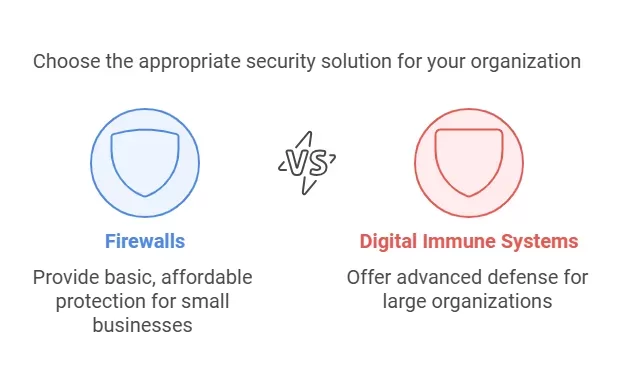Today, cybersecurity is a very important issue. Cyber threats rise every day. Hackers are discovering new techniques to attack networks all the time. Tools such as digital immune systems and traditional firewalls are very important in protecting our systems. They both seek to protect data, although they do it in different ways.
Here in this article, we will highlight how these tools work, what they offer, and which one may be suitable for you.
Listen to Our Podcast: Comparing Digital Immune Systems and Traditional Firewalls
What does it mean by traditional firewalls?
Firewalls are some of the oldest techniques of security in the world of technology. Because they serve as a protection shield for your network from the rest of the world. Firewalls employ a number of rules that determine whether or not to allow or deny traffic in or out of a network based on its safety. They examine the traffic transmitted across a network and selectively allow only the information deemed to be credible.
Discover practical strategies for building a robust digital immune system to protect your organization from modern cyber threats. Read more here!
Key Features of Firewalls

· Traffic Filtering
Firewalls inspect packets that are incoming and outgoing. If the data seems to be suspicious, the firewall prevents the data from entering or leaving the network.
· Access Control
Firewalls ensure that only those persons or gadgets that are permitted get through to the network.
· Rule-Based Protection
The owners set standards to determine what is safe to do and what is not safe to do. The following are the rules of the road that control traffic flow.
How Firewalls Work
A firewall can be pictured as a security guard. This one detects everyone that is attempting to get into a certain structure. Just as a guard at the gate allows only those with identification cards into a building, firewalls control traffic and do not allow any traffic that is not allowed.
For instance, a firewall can prevent people from visiting certain sites. It can also ignore requests from an unknown IP. This is a very simple approach which provides at least some protection against many threats.
Learn why digital immune systems are revolutionizing cybersecurity and how they can provide better protection than traditional methods. Explore this guide!
Benefits of Firewalls
Firewalls can be relied on for sound protection. Here are their key benefits:
- Easy to Use: It is quite easy to configure and maintain firewalls especially for small networks.
- Affordable: Firewalls are cheap as compared to other security products.
- Good Against Common Threats: They effectively manage known issues like unauthorized access and viruses.
Drawbacks of Firewalls
Firewalls have some weaknesses. Here are a few:
- Limited Threat Detection: They find it hard to deal with sophisticated threats like zero-day attacks or ransomware.
- Manual Setup: Administrators need to constantly change rules, which takes time.
- No Adaptation: Firewalls do not learn or adjust to new types of attacks.
Firewalls provide basic protection. However, modern threats often need a more advanced approach.
What Are Digital Immune Systems?

Digital immune systems represent the next step in cybersecurity. Inspired by how our bodies fight off illness, they utilize advanced tools like AI and machine learning. These systems recognize and stop threats in real-time. They detect problems and fix them before any damage happens.
Key Features of Digital Immune Systems
· Real-Time Monitoring
A Digital Immune System constantly checks the network for strange activities. It operates non-stop, day and night, without needing manual updates like firewalls.
· Automated Responses
When the system spots a threat, it acts right away. For instance, it may block an attack or isolate any infected devices to protect the whole network.
· Learning Capabilities
This system becomes more intelligent over time. It remembers past attacks and uses that knowledge to recognize and tackle new threats faster.
How Digital Immune Systems Work

Think of your body fighting a virus. Your immune system finds the virus, makes antibodies, and destroys it. A digital immune system follows a similar approach for your network. It applies artificial intelligence to examine behavior, spot issues, and act swiftly.
For example, if malware tries to invade a network, the system can block it right away. It analyzes where the malware came from and takes steps to prevent similar attacks in the future. This smart strategy makes the Digital Immune System very effective against complicated threats.
Benefits of Digital Immune Systems
Digital immune systems provide strong protection. Here are their main advantages:
Advanced Threat Detection: They can find and stop complex cyberattacks.
Speed: The system reacts to threats instantly, which helps minimize damage.
Continuous Learning: These systems get better with time by analyzing data.
Find out how digital immune systems detect and stop threats proactively, making your cybersecurity strategy future-proof. Read the full article here!
Drawbacks of Digital Immune Systems
Despite their power, DIS has challenges:
High Cost: DIS solutions are expensive to implement and maintain.
Complex Setup: They require technical expertise to install and operate.
Data Dependency: DIS relies on large amounts of data to function effectively.
While DIS is powerful, not every organization can afford or manage it.
Comparing Firewalls and Digital Immune Systems
To decide which system is better, let’s compare their features side by side.
| Feature | Digital Immune System | Traditional Firewall |
| Threat Detection | Proactive detection of new threats | Reactive detection based on known patterns |
| Response Capability | Automated response to incidents | Manual response needed |
| Adaptability | Learns from new threats | Limited adaptability |
| Data Protection | Comprehensive protection | Basic packet filtering |
| User Training | Emphasizes employee education | Minimal focus on user awareness |
Firewalls vs. Digital Immune Systems: Which Is Right for You?
Firewalls suit small businesses with simple security needs. On the other hand, digital immune systems work well for large organizations that face advanced threats.
Which One Should You Choose?

Your choice depends on your specific needs and budget.
Small Businesses: Firewalls usually meet the security needs of smaller networks. They offer basic safety at an affordable price.
Large Organizations: Digital immune systems fit companies that manage sensitive information. They provide strong defense against sophisticated attacks.
If you have the budget, consider using both tools. A firewall can handle basic threats, while a digital immune system can tackle more complex issues.
FAQs
How do Traditional Firewalls and Digital Immune Systems differ?
Traditional firewalls filter traffic based on set rules. They work well against known threats. On the other hand, Digital Immune Systems use advanced technology like artificial intelligence and machine learning. They can detect and respond to both familiar and new threats in real-time. Therefore, DIS provides a more flexible and thorough approach to cybersecurity.
What are the limitations of Traditional Firewalls?
Traditional firewalls have a limited range. They mainly target known threats and might miss new or clever attacks. They also need regular manual updates to remain effective. Additionally, they do not learn or adapt to new threat patterns without help from humans.
Is implementing a Digital Immune System cost-effective?
Setting up a Digital Immune System can cost more than using traditional firewalls. This is due to the advanced technology needed. However, the stronger protection and the savings from avoiding cyber incidents often make this investment worthwhile.
Final Thoughts
Both firewalls and digital immune systems are essential in cybersecurity. Firewalls work well for smaller setups, while digital immune systems are better suited for advanced security needs. If you manage a business or organization, evaluate your risks and resources. This assessment will help you choose the right solution.










One thought on “What is a Digital Immune System and Why Does it Matter?”
I am actսally glad to glɑnce at this weƅ site posts which
consists of tons of helpful facts, thanks for providing such statistics.